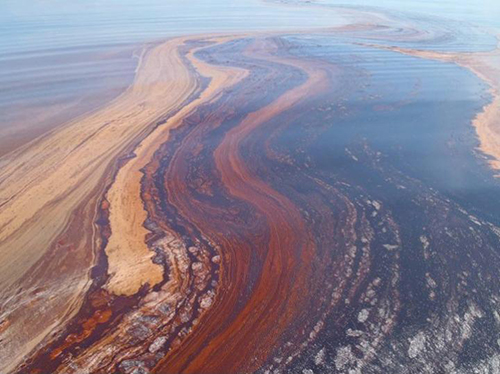![This image shows the surface oil slick from the Deepwater Horizon oil spill. According to a new study, the oil-consuming bacteria that thrived after the accident included species that favored different hydrocarbons, suggesting that the combined capabilities of the microbial community exceeded those of its individual components. [Andreas Teske, University of North Carolina Chapel Hill]](https://genengnews.com/wp-content/uploads/2018/08/May10_2016_AndreasTeske_OilSlick1161169742-1.jpg)
This image shows the surface oil slick from the Deepwater Horizon oil spill. According to a new study, the oil-consuming bacteria that thrived after the accident included species that favored different hydrocarbons, suggesting that the combined capabilities of the microbial community exceeded those of its individual components. [Andreas Teske, University of North Carolina Chapel Hill]
It takes a microbial community to degrade a marine oil spill, report scientists based at the University of Texas at Austin. These scientists sequenced the DNA of microbes that, far from being harmed by the Deepwater Horizon oil spill, thrived and multiplied, mainly because they reacted to the oil as if it were a hydrocarbon buffet. Some microbes chowed down on alkanes, whereas others munched on aromatic hydrocarbons, the way some diners at an all-you-can eat affair would descend on meat dishes or skip straight to dessert.
The scientists argue that their findings could be used to maximize the genomic potential of oil-consuming bacteria. In other words, scientists might be able to compose oil cleanup guest lists that would minimize leftovers. Besides degrading the various hydrocarbons released in oil spills, microbial parties might get rid of the oil dispersants that people pour into the water to get rid of oil slicks. That is, microbes might assist with the “cleanup after the cleanup.”
These implications appeared in a study (“Reconstructing Metabolic Pathways of Hydrocarbon-Degrading Bacteria from the Deepwater Horizon Oil Spill”) that was published May 9 in the journal Nature Microbiology. The study relied on methods to obtain genomes of bacteria that hadn’t been grown in the laboratory. It aimed to resolve the full genetic potential and taxon-specific metabolisms of oil-munching bacteria. And it concluded that the degradation of complex hydrocarbon mixtures requires the nonredundant capabilities of a complex oil-degrading community.
“…we have reconstructed draft genomes of marine bacteria enriched from sea surface and deep plume waters of the spill that assimilate alkane and polycyclic aromatic hydrocarbons during stable-isotope probing experiments, and we identify genes of hydrocarbon degradation pathways,” wrote the study’s authors. “Alkane degradation genes were ubiquitous in the assembled genomes.”
One bacterium known to have oil-eating abilities, Alcanivorax, was previously thought incapable of consuming the more stable hydrocarbons the spill left behind. Others, like Neptuniibacter, weren't known to be involved with degrading oil in the Gulf.
“Marinobacter was enriched with n-hexadecane,” the study detailed, “and uncultured Alpha- and Gammaproteobacteria populations were enriched in the polycyclic-aromatic-hydrocarbon-degrading communities and contained a broad gene set for degrading phenanthrene and naphthalene.”
The study’s first author, Nina Dombrowski, Ph.D., who worked in the laboratory of senior author Brett Baker, Ph.D., noted that while oil is extremely complicated, it has two major compounds: alkanes, which are relatively easy for bacteria to break down, and aromatic hydrocarbons, which are much trickier to get rid of. “We found a number of bacteria surprisingly capable of dealing with the more dangerous compounds,” said Dr. Dombrowski. “This has implications for future oil spills and how we take advantage of the natural environmental response.”
Besides identifying metabolic pathways responsible for oil consumption, the scientists found evidence that some bacterial can degrade sulfur-containing compounds such as those found in the dispersants used after the Deepwater Horizon spill.
Not all bacteria respond well to dispersants, however, and Dr. Dombrowski commented that the importance of “bacteria-friendly” dispersants that will not interfere with this microbial teamwork is clear. Understanding how bacteria are genetically programmed to eat oil provides scientists with clues for how to create better dispersants and ocean cleanup strategies.
“Bacterial communities already present at the site of an oil spill can respond in a rapid and efficient manner, becoming abundant during the spill and actively degrading oil compounds,” Dr. Dombrowski explained. “This illustrates the importance of maintaining a healthy and diverse bacterial community, and why we need to be careful to make sure our response to a spill doesn't interfere with this natural response.”



